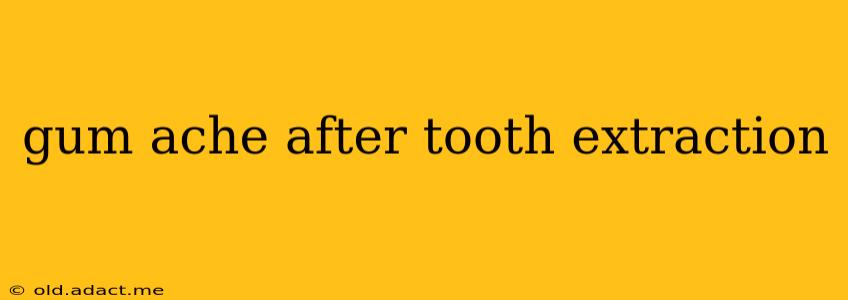A tooth extraction, while a common procedure, often leaves patients with lingering discomfort, particularly a persistent gum ache. Understanding the causes, effective treatments, and preventative measures can significantly improve post-extraction recovery. This comprehensive guide addresses common concerns and provides valuable insights to manage this often-uncomfortable experience.
What Causes Gum Ache After Tooth Extraction?
Several factors contribute to gum ache following a tooth extraction. The most common include:
- Inflammation: The extraction site is essentially an open wound, and inflammation is a natural part of the healing process. This inflammation causes swelling and pain in the surrounding gums.
- Dry Socket: Also known as alveolar osteitis, a dry socket occurs when the blood clot protecting the extraction site dislodges or dissolves prematurely. This exposes the underlying bone and nerve endings, resulting in severe pain, often described as a throbbing or sharp ache. Dry sockets are more common with lower wisdom tooth extractions.
- Infection: Infection can occur if bacteria enter the extraction site. Signs of infection include increased pain, swelling, pus, and fever.
- Residual bone fragments: Occasionally, small bone fragments remain in the extraction socket, irritating the gum tissue and causing prolonged pain.
- Nerve irritation: The extraction process may cause temporary irritation to nearby nerves, leading to lingering discomfort.
How Long Does Gum Ache After Tooth Extraction Typically Last?
The duration of gum ache varies significantly depending on the complexity of the extraction, individual healing rates, and adherence to post-operative instructions. Generally, mild discomfort subsides within a few days, while more significant pain may persist for a week or longer. However, persistent or worsening pain beyond a week warrants a visit to your dentist.
What Can I Do to Relieve Gum Ache After Tooth Extraction?
Managing post-extraction gum ache involves following your dentist's instructions diligently and employing various self-care strategies:
- Follow your dentist’s post-operative instructions: This is paramount for optimal healing. This typically includes specific medication regimens, diet recommendations, and oral hygiene practices.
- Over-the-counter pain relievers: Ibuprofen or acetaminophen can effectively manage mild to moderate pain. Always follow the recommended dosage.
- Ice packs: Applying ice packs to the affected area for 15-20 minutes at a time can help reduce swelling and pain in the early stages of recovery.
- Saltwater rinses: Gentle rinsing with warm saltwater can help clean the extraction site and promote healing. Avoid vigorous rinsing, which can dislodge the blood clot.
- Rest: Adequate rest allows your body to focus its energy on healing.
Is a Dry Socket Painful?
Yes, a dry socket is significantly more painful than typical post-extraction discomfort. The exposed bone and nerve endings cause a sharp, throbbing pain that radiates beyond the extraction site. If you suspect you have a dry socket, it's crucial to contact your dentist immediately. They can clean the socket and apply a medicated dressing to alleviate the pain and promote healing.
What Should I Do if My Gum Ache Doesn't Improve or Worsens?
If your gum ache doesn't improve or worsens despite self-care measures, or if you experience any signs of infection (increased pain, swelling, pus, fever), seek immediate dental attention. Prompt treatment can prevent complications and ensure a successful recovery.
How Can I Prevent Gum Ache After Tooth Extraction?
While you can't completely eliminate the possibility of post-extraction discomfort, following these preventative measures can significantly minimize the risk:
- Follow your dentist's instructions meticulously: This includes avoiding smoking, using a straw, and consuming alcohol, all of which can impede healing and increase the risk of dry socket.
- Maintain excellent oral hygiene: Regular brushing and flossing before and after the extraction promote good oral health and reduce the risk of infection.
- Eat a soft, nutritious diet: This allows your gums to heal without irritation.
- Attend your post-operative check-up: This allows your dentist to monitor your healing progress and address any potential problems early.
This information is for general knowledge and does not constitute medical advice. Always consult with a qualified dental professional for any concerns regarding your oral health and post-extraction care.
